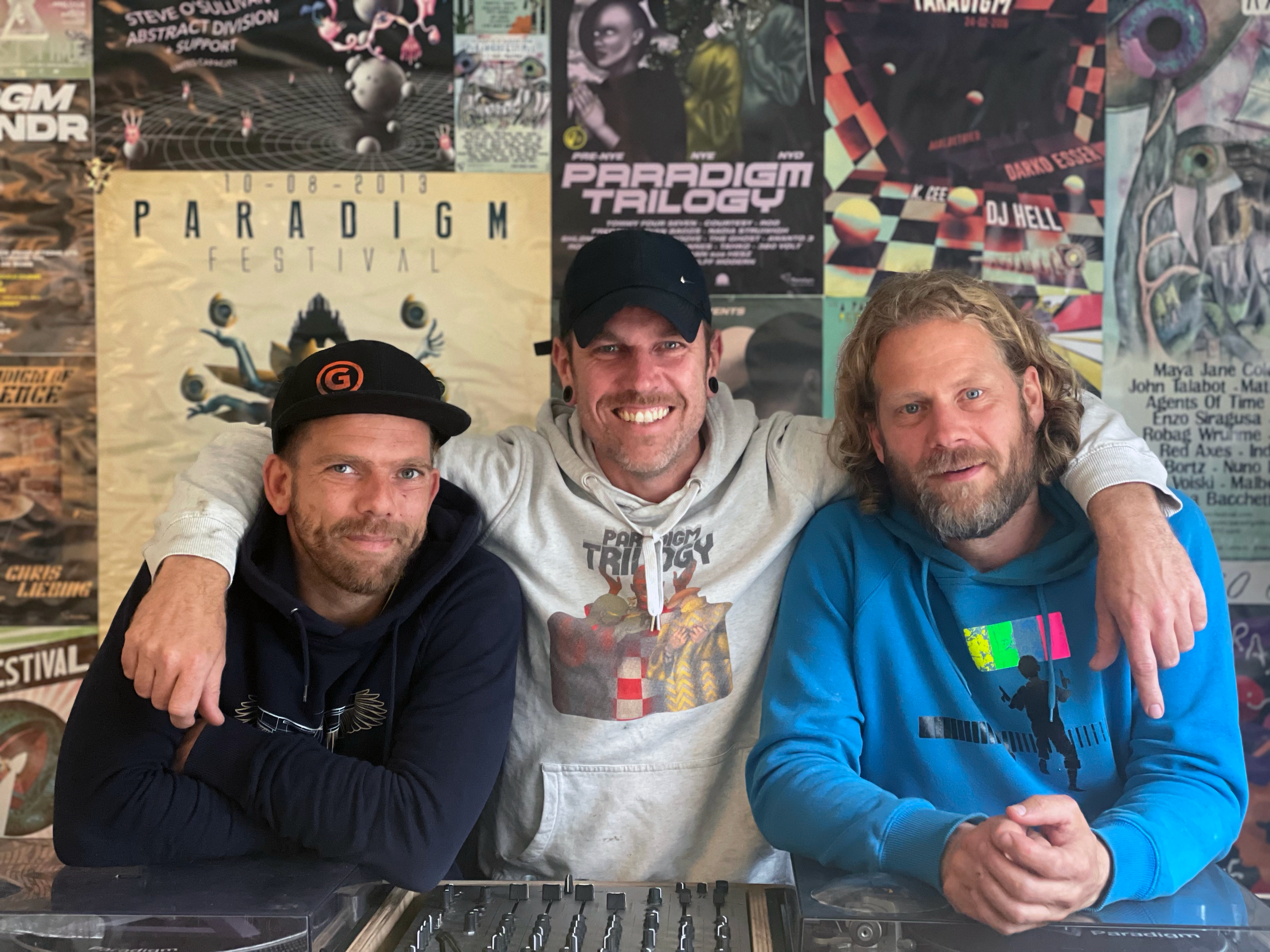In response to our upcoming ten year anniversary, we sat down with Paradigm’s three owners to talk about their ongoing journey. They opened up about some of the highlights, the low points, struggles and ambitions they’ve experienced throughout the past ten years. We take a look at Paradigm’s history and their vision for its future. Read all about it as a prelude to coming Saturday.
Ten years of Paradigm. How does that feel?
Paul: It doesn’t really feel like ten years as we’ve been at a standstill for two of them. That’s certainly how I feel. There weren’t really ten Paradigm years to speak of because of the Corona pandemic, more like 8,5. But we still started out ten years ago and that definitely feels like a lifetime ago!
About that starting point, the first club night at the Helsinkistraat. What’s the first thing that comes to mind?
Tom: Sweatiness and stickiness!
Piter: It was also cold, especially the Glazen Loods.
Paul: “Raw” is the first thing that comes to mind. What a raw club that was!
Piter: I remember that it was actually freezing during our first club event with Kollektiv Turmstrasse…
Paul: … Oh yeah! We placed a couple of petroleum heaters in the club to counter the cold. The night started out with everyone gathered around them. This problem didn’t persist when the dance floor filled up with a sizeable crowd and the cold made way for a comfortable warmth.
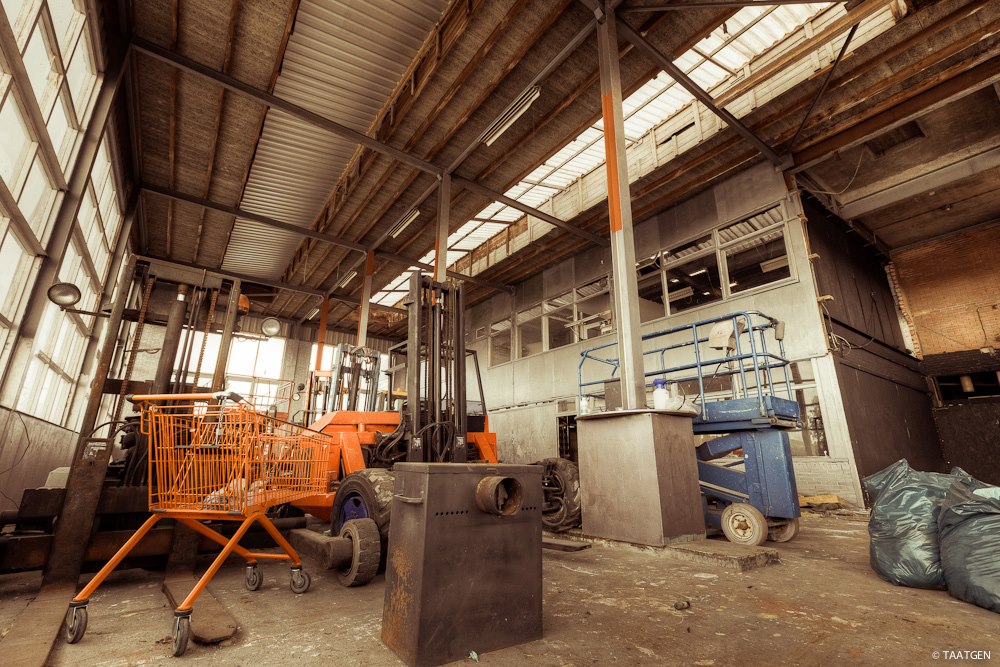
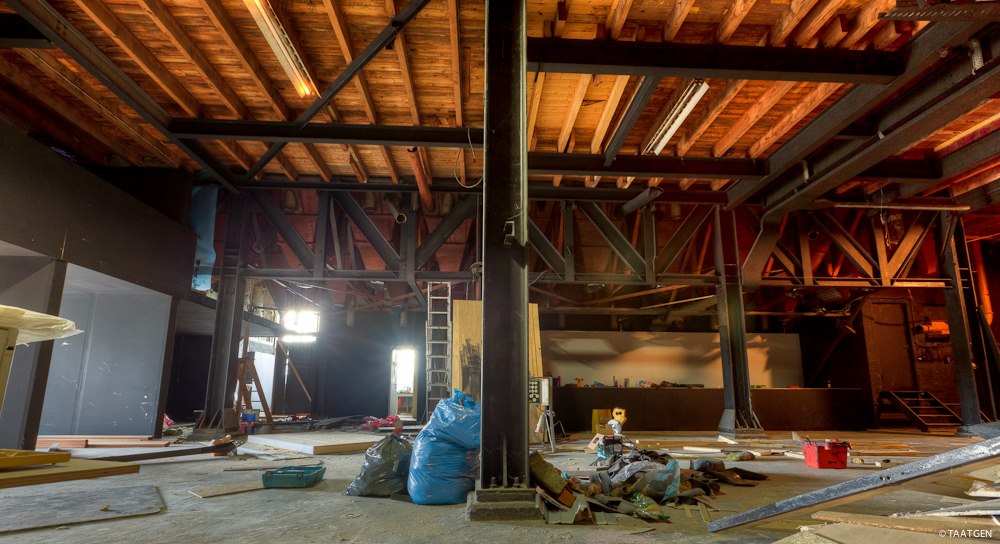
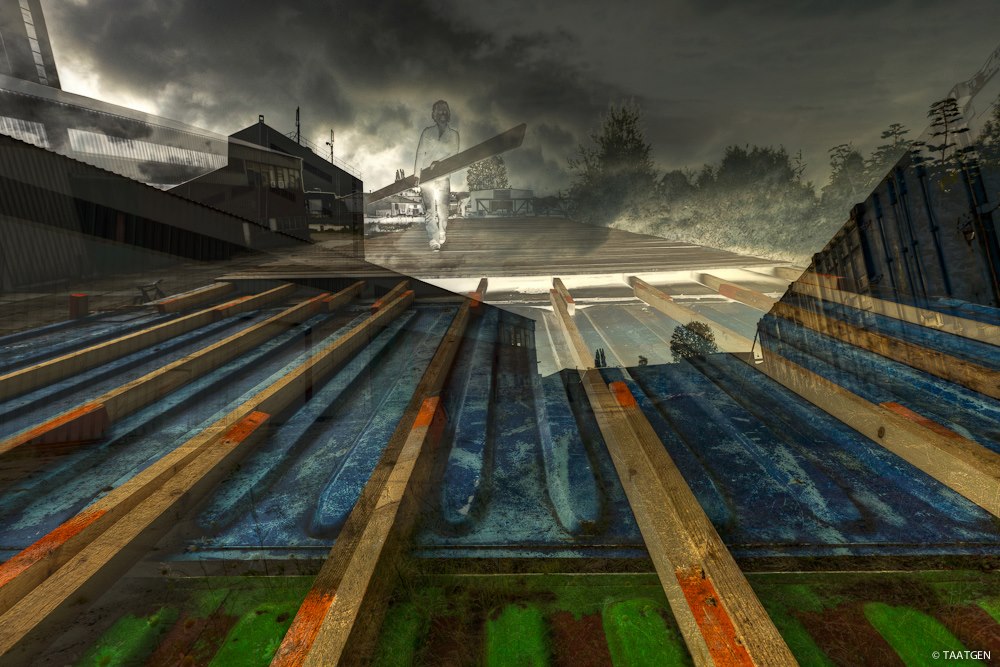
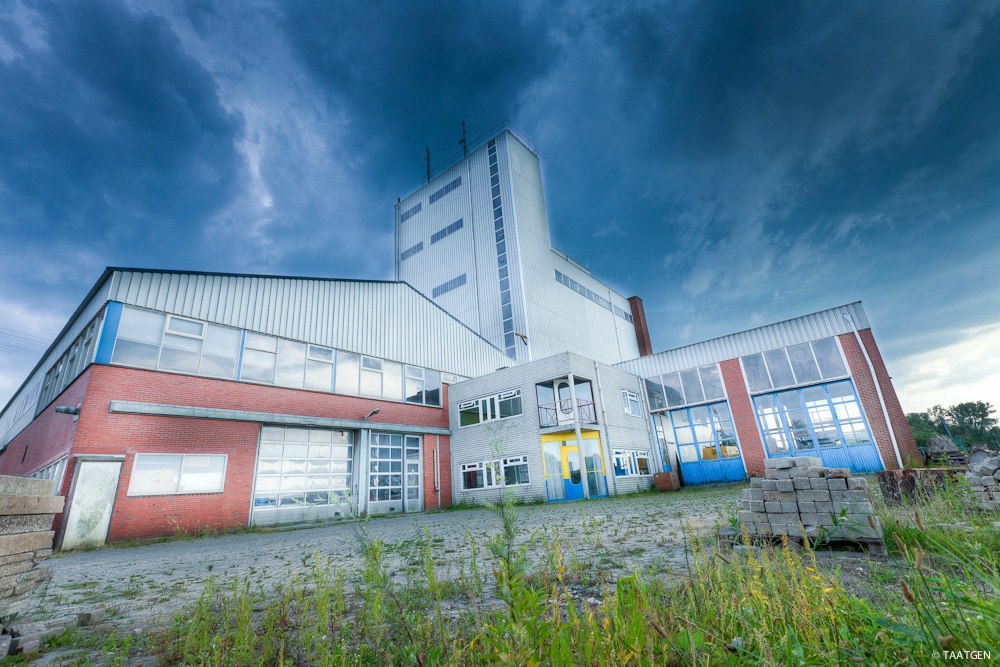
2011: Club Paradigm at the Helsinkistraat.
Photos by Gerard Taatgen.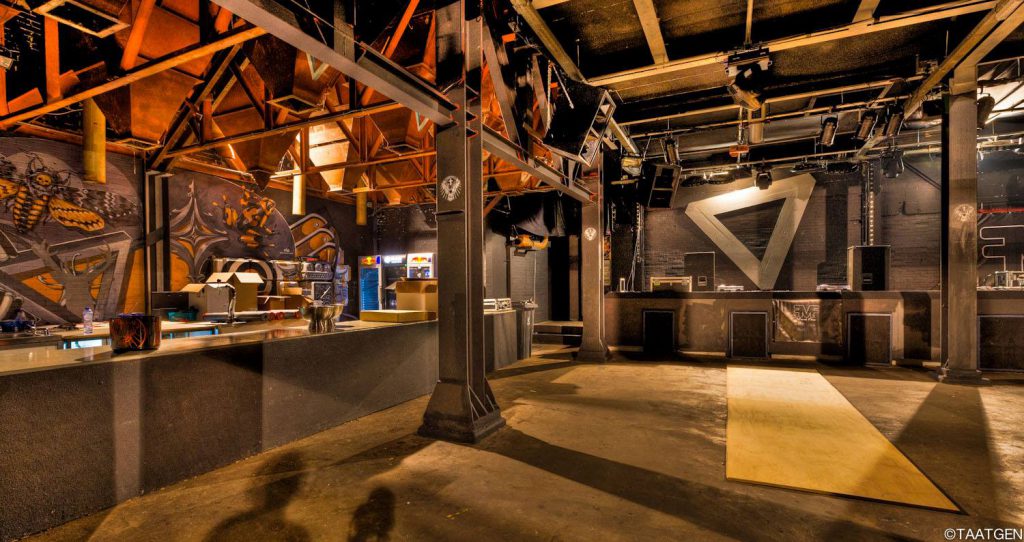
How did you guys prepare for the event?
Paul: We were awake for about three days straight to finish all of the preparations in time, with literal minutes to spare. It was such a make-do event. We honestly just made it up as we went along. We didn’t have any experience building a club in an old factory, you know?!
Tom: For me as a visitor, it was obvious that something special was happening there. There wasn’t anything like this in Groningen or in the whole northern Netherlands, really. It might’ve been a bit improvised but it was absolutely perfect from start to finish.
Piter: We immediately sold out and we received so many positive reactions. Bizarre.
Paul: It was the event we decided that it had to become an actual club. We signed a lease for the building and we started to invest in this space. How we were going to organize the program technically was still ways away, we just wanted to get started. The first party was a separate event, since we didn’t have a night time permit yet. We were forced to organize it during the day. Then Berlin came to mind with its Sunday events that were happening all over the city. We thought, why shouldn’t we follow suit? Which we did and that’s the origin story of our beloved Sunday Afternoon Collective.
Piter: At some point we conferred and agreed that we should get an official club permit because of all the awesome reactions and our own desire to organize events at night as well. That’s when we requested a meeting at the municipality. They permitted us to keep at it whilst we had to make some mandatory changes and adjustments to the building to meet the standard they set. This all came together when we finally got fully licensed by the end of 2012.
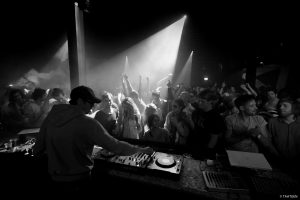
Your feelings the day after?
Paul: We felt so euphoric! I simply couldn’t stop thinking about it. We were all standing on top of the DJ booth when the closing track was playing. Paraformers included, even though they didn’t officially exist as of that moment. It all just came together organically.
What do you remember about that first period at the Helsinkistraat?
Paul: Mainly the afters. They took place after every event, upstairs in our offices.
Piter: The togetherness. But also the whole process of learning on the job, if you will. Not necessarily knowing what we were doing. For example, we had to write a report, assessing the strength of the tower connected to the building. We had to weld stuff left and right. We also had to install sinks for people to wash their hands, as stated in the permit. We had to work through several nights whilst supported by friends and volunteers to finish everything in time for the event. That was really special. We did it all ourselves…
… the events had such a raw and underground feeling. I remember having a couple friends over. They were searching for a way inside, being drawn by the heavy bass sounds coming from the premises. They simply couldn’t find the entrance. It took someone to go outside for them to finally find their way inside. Just really vague stuff, you know.
Paul: We did that on purpose! It was almost impossible to find the entrance. You had to make an effort to get inside.
Piter: Exactly! I loved things like that.
Paul: When you did find the entrance, you would enter something resembling a sluice. It was a corridor that was pitch black filled with pounding beats. Whenever you went past the doorman, it was like you just travelled ten floors down and ended up in a disheveled and grimy basement. It was such a particular effect, it didn’t really get more underground than that. An illusory experience. Together with one of our artists, we’re going to recreate this experience for our Future Club. Entering the club will be transformative. That’s going to be dope!
Tom: I still have a picture up in my bathroom originating from NYE 2011. I was playing as 380Volt and I was also puzzled about where to enter. The volume level went through the roof as well. I will never forget that.
Paul: Initially, when we arranged the sound system for that particular event, we noticed we underestimated the sound levels needed to match the space. So I panic-bought three times as much gear. Massive speaker towers were erected and the sound made the building shake to its foundations, which was insane! Then these guys from Ellendeling started to play pitched-down hardcore tracks at 115 BPM. They completely floored the whole crowd…. …it all was such a playful gathering. No direction at all. Everyone just fell into place and it still is one of my favourite memories.
Tom: Look, this is the picture I’m talking about. You can read it off people’s faces that it was incredibly loud in there.
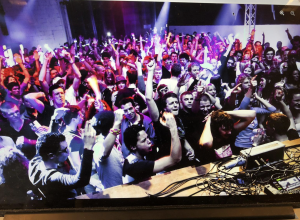
Piter: One of the things I remember most about that event in 2011 was that it was our first NYE foray. This concluded in us getting a permit to host that particular event at the very last moment on the 31st of December at 5PM in the afternoon.
Paul: Pfoh, that was stressful.
Piter: The municipality didn’t know what to do with it. We already sold a lot of tickets at that point, close to 1500. Then they got wind of it and a permit process was quickly set up because we said: “We simply can’t go back now.” The event itself turned out to be an absolute banger.
Paul: Financially, however, it turned out to be a big loss. It was a very expensive production whilst people showed up late and hardly drank anything.
The finance side wasn’t all that easy then, was it?
Paul: No, it wasn’t, especially the first years
Piter: We turned a small profit in 2011 but it only cost us money from 2012 until 2017.
Paul: We had to invest a lot of financial resources. We obviously had artists for every event and we also couldn’t open our doors as much as we wanted, even though we settled at the Helsinkistraat as our semi-permanent home.
Piter: We were also very inexperienced. It cost us a lot of money just to learn the basics of running a club!
Paul: We’ve given so much away as well. At the time, we would open up the bar at the end of an event for everyone that stuck around. For all of our friends, which would normally consist of half the crowd, really. That’s how those afters started.
Piter: We didn’t have any other options. Well, you always have options but that was just the nature of the work we did, which was incredibly fun. That’s how I used to think and that’s still the case. It led to numerous sleepless nights. But I always had faith that it would all come together in the end.
Tom: Yeah, an intrinsic drive was always there. It was tangible.
Paul: We really felt like we struck gold with this concept but we also lost a lot of money chasing this dream. This sometimes resulted in conflict with our suppliers, which wasn’t ideal to say the least. But they understood our vision, which was an ongoing process whilst striving for success. We just needed time to set it all up. That’s how we basically pulled through year after year. Our goal was to keep everyone happy, but that was a tough challenge with hardly any finances. It was a matter of dividing our financial resources left and right to keep going, sometimes going week by week. As this went on, some years were harder than others but in the end we all knew we had a recipe for success. We thought that if we kept going, we could include more people, streamline our processes and create a healthy growth for Paradigm. It really took a turn for the best after two years of settling ourselves at the Suikerunie terrain…
… those 5 years of investing plus moving our home towards the Suikerunie terrain almost did a number on us. However, this move enabled us to truly do things our way, which was sorely needed!
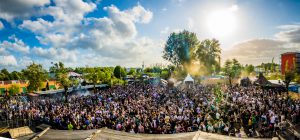
The move from the Helsinkistraat to the Suikerunie terrain has saved Paradigm’s existence, then?
Paul: Oh for sure. The tension surrounding the whole thing was tangible. Everyone missed the Helsinkistraat, including ourselves. Nobody really wanted to leave but we knew we had to. The costs were becoming almost insurmountable through our landlord constantly increasing our rent. Combine this with the limited capacity the building had and we were basically forced to move out. However, this also signaled the fresh start we were aiming for.
Tom: I already caught some wind of the fact that Paradigm had to move out of the Helsinkistraat when I started supporting Hessel with the programming back in 2014.
Piter: Yeah, we were quite early with regards to brainstorming new ideas for a new location. We were talking about new concepts, how we would arrange everything in Het Zeefgebouw, the frequency of our events as well as down-scaling our organization. We wanted to create a little breathing room for ourselves to increase our ability to face future challenges. That’s why it was so great to experience our first intimate get-together in Het Zeefgebouw, spearheaded by Steve O’Sullivan and Awanto3, which sold out pretty much right away. That gave us a lot of confidence. So much so that we felt ready for bigger productions… and because I knew in advance that we would have to make this move one day. It gave me a chance to properly prepare myself mentally.
Tom: Yeah, you handled the whole thing the best out of everyone, I believe.
Piter: I think so too. It felt like the right call to make, so the desire to do so gripped me very quick.
Paul: That’s right, we were in need of a refresh as an organization: re-evaluate our organizational structure, increasing our control regarding our situation and a heavier focus on sustainable themes. These are the things that we believed would come to fruition whenever we’d find our own place. Both Piter and I also became dads right around that time, which caused a perspective shift in some ways. It was a bit touch-and-go with our first festival as we still were getting to know our terrain and what we could accomplish here. Same goes for Het Zeefgebouw. We had to build and complete different stages from scratch. Our funds were also depleting since we just moved, including the debts we built up over the years. So yeah, that first period after we moved was particularly challenging.
Piter: Agreed, especially the end of 2016 and the first few months of 2017 were tough to work with. We came really close to bankruptcy but we were able to pull through because of the undying support we received from everyone. That’s how we were able to keep going!
Paul: Exactly. Numerous rumours circulated about the health of our organization and people were wondering if we would make it. Despite this, we knew that if we were able to keep going for a little while longer, we would switch from trying to survive to slowly thrive under the circumstances. Our terrain took more and better shape with time, which laid the foundation for great productions and the ability to start cleaning up our debts.
Tom: It was an arduous time, indeed. But everyone knew this: Paradigm has the sickest Festival Terrain in the Netherlands. Our agency regarding our own situation started to increase more and more.
Paul: When we announced that Richie Hawtin would attend Paradigm Festival 2017, our ticket sales skyrocketed. This allowed us to settle with a lot of creditors and shift most of our focus towards our future.
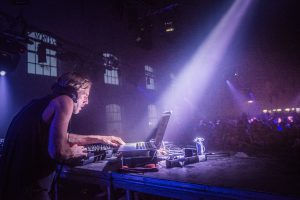
What are some of your proudest moments of the past 10 years?
For me it’s how similar our current terrain and the overall vibe is compared to the situation at the Helsinkistraat. I really feared we wouldn’t reach that level ever again. It’s the way the areas in Het Zeefgebouw are structured. The sweaty Basement area, for instance, feels like a colossal bunker whilst retaining a sense of organic intimacy at the same time.
Paul: The family feeling of our organization and everyone that’s closely connected. It’s a really tight knit and creative community. We create the most incredible shit. We book awesome artists. We host some of the most amazing events. This all comes straight from our hearts with lots of passion, love for everything, for our visitors, for the art and for the scene. The vibe we establish together with our team, our volunteers, suppliers and our visitors; that’s something I’m incredibly proud of.
Tom: So many great things spawn from this foundation. There are so many of us here that feel at home, who experience personal development and growth. It also means a great deal that we found our own home turf. That we’re able to do what we love, harmoniously and on our own terms.
Piter: I’m so, so proud that we’ve been able to keep going for ten years straight, which is a great accomplishment with regards to the challenges we faced doing this.
Paradigm is an established name. From small and intimate parties to mega productions. Which events are the most memorable?
Paul: You’re only as good as the last event you hosted. I feel this all the time. The first time Guy J on NYD: legendary. The first all nighter by Speedy J: legendary. Speedy J all night long in the Basement of Het Zeefgebouw three years ago: legendary. The first Paradigm Festival on a Sunday: legendary. Our first NYE: legendary. The most recent NYE with it’s deco, which was incredibly well organized down to the last detail: legendary. The most recent Paradigm Festival, which felt really complete: legendary. Planet Paradigm in our Forest with Zip among others: legendary. Our collab with ZeeZout and that enormous LED ring at the main stage: legendary. It’s always a challenge and a joy to keep raising the bar. Every event you host should be your best. We strive to reach that goal each time. One that really sticks out is the handwritten letter that Piter sent to Richie Hawtin which convinced him to come and play at Paradigm Festival. Or the time Speedy J said to Tom that Paradigm is the only place where he feels safe to postponing the first drop as much as he does sometimes. Those are the moments that stay with you.
Tom: Don’t forget the fact that we hardly compromised on who we are. I’m filled with pride thinking about that, too!
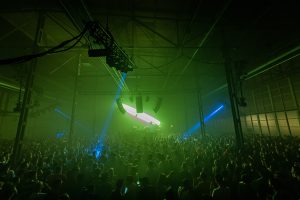
Tom, you became co-owner in 2018. What has been your experience since then?
Tom: I realized earlier in this conversation that I played my music for the first time at Paradigm in 2011. If you would’ve asked me then: would you like to take charge together with Paul and Piter? I would’ve simply said: tell me where to sign! Because, by then, I was already completely sold. I’m especially thankful to Hessel, who unequivocally put his faith in me in assisting him as a booker. Not to mention Paul and Piter who gave me this chance. I’m unable to do anything else anymore. This is my life. My trade and my business. It’s also personal. All of it is such a thrill! I still remember that Paul and Piter gave me 24 hours to make a decision and me calling them back within the hour to accept! The Paradigm feeling has settled within me and that’s never going to go away.
That Paradigm feeling, what does that mean?
Piter: It’s hard to put into words what it means exactly, you’d really have to come here to experience it. Visit the dance floor, talk to the people. Paradigm stands for freedom and respect towards one another.
Tom: I would say commitment, purity.
Paul: Love for everything and everyone around us.
Piter: When people come over for the first time, they’re usually a little overwhelmed with all the facets Paradigm has to offer. The extraordinary location, the deco, the vibe. But, in the end, they usually feel right at home real quick. They can be themselves and that puts most people at ease immediately. It’s a great feeling. You can find this energy all over the terrain.
Tom: This feeling also extends towards the numerous artists who played here over the years. They feel at home and like to stick around. Most often you can find them talking to various people whenever they come over.
Paul: I would like to reiterate that I’m so incredibly happy with our terrain and the way it looks right now! The way we collectively shape it. We’ve all got our own expertise with our own perspectives, which contribute to the development of all our stages and different areas. It’s the way this collab is going with regards to the terrain and everyone’s influence in its development. It makes us think about what it would look like after eight years?! Whenever I show anyone around I always say: nothing you see is final. Everything is in a constant state of development. It just keeps getting better!
Does Paradigm have a final shape or form?
Tom: I don’t think so. I always like what Piter says about it: “Paradigm is much bigger than we are. If Paradigm stays true to form, it will have a life way after we’re done with it.” We have a responsibility to keep Paradigm on track this way and that people stay involved.
Piter: We are representatives of the brand that Paradigm is. We’ve conjured it up and created it. But it’s something that belongs to everyone and it will stay alive because of everyone’s contribution to it. Especially those of us who put so much time and effort in Paradigm. This is our lifeline.
Tom: I was talking to a group of people last weekend (Intimate Forest Session #1). I asked them if they’ve been here before. They mentioned: “We were here for the first time last year, but we weren’t allowed to enter before.” That’s when I realized that these boys and girls were 9 years of age when Paradigm was founded. The involvement of the younger generation has always been seamless and is truly one of the main reasons we can keep going.
What else would you guys like to accomplish on this terrain?
Piter: We want to completely cover and close up some of our festival stages and make all of it ready to go for our events.
Paul: And, when our lease agreement comes to an end here, we want to set it all up in such a way that it can still be used in another shape or form by the next generation who’ll make this terrain their own. Maybe we can keep growing with our festival, who knows. Paradigm has become such a large brand that it’s impossible to make all of these decisions ourselves. We only try to guide it all in the way we think is best. Our successors will also be able to influence the direction of Paradigm.
Tom: We’re keeping an open mind and attitude with regards to changes and innovations. This is something that’s going to remain this way. We’re here right now, showing leadership and sharing a vision but that doesn’t mean great ideas and innovations may cross our path and we want to embrace this too. To respond adequately. For example, the realization that it’s important to take our environment into account when hosting our events is such a large part of Paradigm today. We’ve shown this more recently but it wasn’t that important to us when we first started.
Anything you’d like to add?
Paul: The world has “hardened” somewhat during the Corona-crisis. There’s more polarization than ever. That’s why I would like to give this message to anyone who reads this: stay true to yourself, don’t stray from your path in life and try not to get riled up by whatever forces that are at play. Let’s try and stay together as much as we can.
